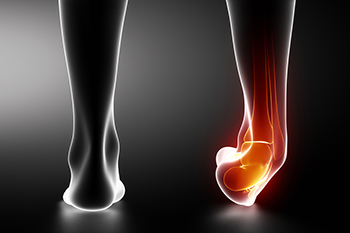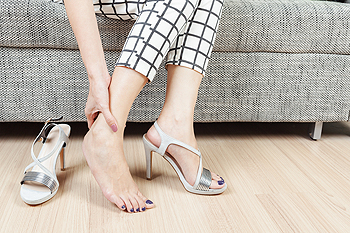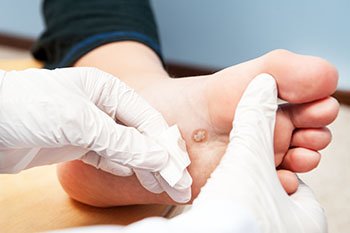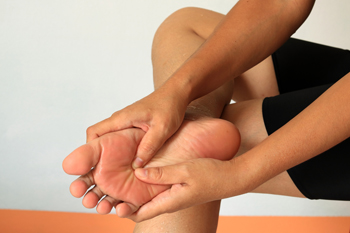Connect With Us
Blog
Items filtered by date: December 2021
The Importance of Diagnosing an Ankle Sprain
 The bones in the ankle are connected by a variety of ligaments. Ankle sprains occur when these ligaments become either overstretched or torn, usually because the ankle is twisted. Mild ankle sprains mean that the ankle is tender and swollen, but more severe ankle sprains can make the ankle unstable and unable to support any weight. Patients who believe they may have sprained an ankle would be wise to consult with a podiatrist, because the symptoms of an ankle sprain are similar to those of a broken ankle, and an x-ray may be necessary. Recurring or severe sprains can also cause long-term weakness and joint pain. Upon the diagnosis of an ankle sprain (or fracture), a podiatrist will be able to provide a treatment plan for the injury.
The bones in the ankle are connected by a variety of ligaments. Ankle sprains occur when these ligaments become either overstretched or torn, usually because the ankle is twisted. Mild ankle sprains mean that the ankle is tender and swollen, but more severe ankle sprains can make the ankle unstable and unable to support any weight. Patients who believe they may have sprained an ankle would be wise to consult with a podiatrist, because the symptoms of an ankle sprain are similar to those of a broken ankle, and an x-ray may be necessary. Recurring or severe sprains can also cause long-term weakness and joint pain. Upon the diagnosis of an ankle sprain (or fracture), a podiatrist will be able to provide a treatment plan for the injury.
Ankle sprains are common but need immediate attention. If you need your feet checked, contact Dr. Nicholas Przystawski from Central Florida Foot Care, PA. Our doctor can provide the care you need to keep you pain-free and on your feet.
How Does an Ankle Sprain Occur?
Ankle sprains take place when the ligaments in your ankle are torn or stretched beyond their limits. There are multiple ways that the ankle can become injured, including twisting or rolling over onto your ankle, putting undue stress on it, or causing trauma to the ankle itself.
What Are the Symptoms?
- Mild to moderate bruising
- Limited mobility
- Swelling
- Discoloration of the skin (depending on severity)
Preventing a Sprain
- Wearing appropriate shoes for the occasion
- Stretching before exercises and sports
- Knowing your limits
Treatment of a Sprain
Treatment of a sprain depends on the severity. Many times, people are told to rest and remain off their feet completely, while others are given an air cast. If the sprain is very severe, surgery may be required.
If you have suffered an ankle sprain previously, you may want to consider additional support such as a brace and regular exercises to strengthen the ankle.
If you have any questions please feel free to contact our office located in Leesburg, FL . We offer the newest diagnostic and treatment technologies for all your foot and ankle needs.
Read more about Ankle SprainsHelping Your Teen Daughter Balance Foot Health and Fashion
You can help your teenage daughter strike a healthy balance between foot health and fashion. Encourage them to wear more supportive footwear (which can still be cute) on a daily basis, while reserving high heels for special occasions. Explain that wearing high heels regularly can damage their muscles and even change their gait. Go over modifications that can help mitigate any damage caused by high heels while still satisfying their desire to be fashionable. For instance, 1 or 2 inch heels can cause fewer foot issues than 4 inch heels. Wider high heels help distribute body weight much more evenly than stilettos, and wider toe boxes avoid toes being squished from pointy or narrow-toed shoes that place excessive pressure on the bones of the foot. When you take them shoe shopping, help them choose footwear that fits well and is comfortable right then and there, rather than buying tighter shoes with the hope of stretching them out at home. Most flip flops do not provide adequate support either and should only be worn getting to and from the beach, in public places that are wet (around pools, in locker rooms and public showers, etc.) and for short periods of time. For more tips on proper footwear and foot care for your teenager, contact a podiatrist.
The health of a child’s feet is vital to their overall well-being. If you have any questions regarding foot health, contact Dr. Nicholas Przystawski of Central Florida Foot Care, PA. Our doctor can provide the care you need to keep you pain-free and on your feet.
Tips for Keeping Children's Feet Healthy
- Make sure their shoes fit properly
- Look for any signs of in-toeing or out-toeing
- Check to see if they have Clubfoot (condition that affects your child’s foot and ankle, twisting the heel and toes inward) which is one of the most common nonmajor birth defects.
- Lightly cover your baby’s feet (Tight covers may keep your baby from moving their feet freely, and could prevent normal development)
- Allow your toddler to go shoeless (Shoes can be restricting for a young child’s foot)
- Cut toenails straight across to avoid ingrown toenails
- Keep your child’s foot clean and dry
- Cover cuts and scrapes. Wash any scratches with soap and water and cover them with a bandage until they’ve healed.
If you have any questions, please feel free to contact our office located in Leesburg, FL . We offer the newest diagnostic and treatment technologies for all your foot care needs.
Read more about How to Care for Your Child's FeetHeel Pain Can Be Treated!
Cryotherapy for Plantar Warts
A wart on the sole of your foot, also known as a plantar wart, is a benign, fleshy growth that is caused by the human papillomavirus (HPV). Plantar warts are often painless and can go away on their own, however, this is not always the case. Warts can cause pain or discomfort if they are in areas that bear a lot of weight, grow inward due to pressure, or rub against your shoes and socks. Without treatment, plantar warts can also take years to disappear. One potential treatment option is cryotherapy. This is a fairly simple procedure in which the doctor applies a liquid nitrogen solution on the wart, freezing it. A blister then forms around the wart within 24 hours and can be removed after about one week. Two cryotherapy sessions may be needed to fully remove the wart. For more information about this and other treatments for plantar warts, please consult with a podiatrist.
Plantar warts can be very uncomfortable. If you need your feet checked, contact Dr. Nicholas Przystawski from Central Florida Foot Care, PA. Our doctor will assist you with all of your foot and ankle needs.
About Plantar Warts
Plantar warts are the result of HPV, or human papillomavirus, getting into open wounds on the feet. They are mostly found on the heels or balls of the feet.
While plantar warts are generally harmless, those experiencing excessive pain or those suffering from diabetes or a compromised immune system require immediate medical care. Plantar warts are easily diagnosed, usually through scraping off a bit of rough skin or by getting a biopsy.
Symptoms
- Lesions on the bottom of your feet, usually rough and grainy
- Hard or thick callused spots
- Wart seeds, which are small clotted blood vessels that look like little black spots
- Pain, discomfort, or tenderness of your feet when walking or standing
Treatment
- Freezing
- Electric tool removal
- Laser Treatment
- Topical Creams (prescription only)
- Over-the-counter medications
To help prevent developing plantar warts, avoid walking barefoot over abrasive surfaces that can cause cuts or wounds for HPV to get into. Avoiding direct contact with other warts, as well as not picking or rubbing existing warts, can help prevent the further spread of plantar warts. However, if you think you have developed plantar warts, speak to your podiatrist. He or she can diagnose the warts on your feet and recommend the appropriate treatment options.
If you have any questions please feel free to contact our office located in Leesburg, FL . We offer the newest diagnostic and treatment technologies for all your foot and ankle needs.
Caring for Your Feet if You Have Peripheral Diabetic Neuropathy
If you are a diabetic, peripheral diabetic neuropathy makes any break in the skin of your feet potentially problematic. Peripheral diabetic neuropathy can cause nerve damage, which in turn, creates a lack of sensation. This disease is also responsible for circulation issues and other factors that contribute to a reduced capacity within your body to heal itself. Daily foot checks can help you detect and seek proper treatment for any developing wounds. Comfortable footwear and moisture wicking socks with no seams to rub against your foot may aide in wound prevention. It is also recommended to trim your nails regularly and keep your feet clean and dry. Regular check ups with a podiatrist should be an important component in your foot care and prevention plan.
Neuropathy
Neuropathy can be a potentially serious condition, especially if it is left undiagnosed. If you have any concerns that you may be experiencing nerve loss in your feet, consult with Dr. Nicholas Przystawski from Central Florida Foot Care, PA. Our doctor will assess your condition and provide you with quality foot and ankle treatment for neuropathy.
What Is Neuropathy?
Neuropathy is a condition that leads to damage to the nerves in the body. Peripheral neuropathy, or neuropathy that affects your peripheral nervous system, usually occurs in the feet. Neuropathy can be triggered by a number of different causes. Such causes include diabetes, infections, cancers, disorders, and toxic substances.
Symptoms of Neuropathy Include:
- Numbness
- Sensation loss
- Prickling and tingling sensations
- Throbbing, freezing, burning pains
- Muscle weakness
Those with diabetes are at serious risk due to being unable to feel an ulcer on their feet. Diabetics usually also suffer from poor blood circulation. This can lead to the wound not healing, infections occurring, and the limb may have to be amputated.
Treatment
To treat neuropathy in the foot, podiatrists will first diagnose the cause of the neuropathy. Figuring out the underlying cause of the neuropathy will allow the podiatrist to prescribe the best treatment, whether it be caused by diabetes, toxic substance exposure, infection, etc. If the nerve has not died, then it’s possible that sensation may be able to return to the foot.
Pain medication may be issued for pain. Electrical nerve stimulation can be used to stimulate nerves. If the neuropathy is caused from pressure on the nerves, then surgery may be necessary.
If you have any questions, please feel free to contact our office located in Leesburg, FL . We offer the newest diagnostic and treatment technologies for all your foot care needs.
Read more about Neuropathy



